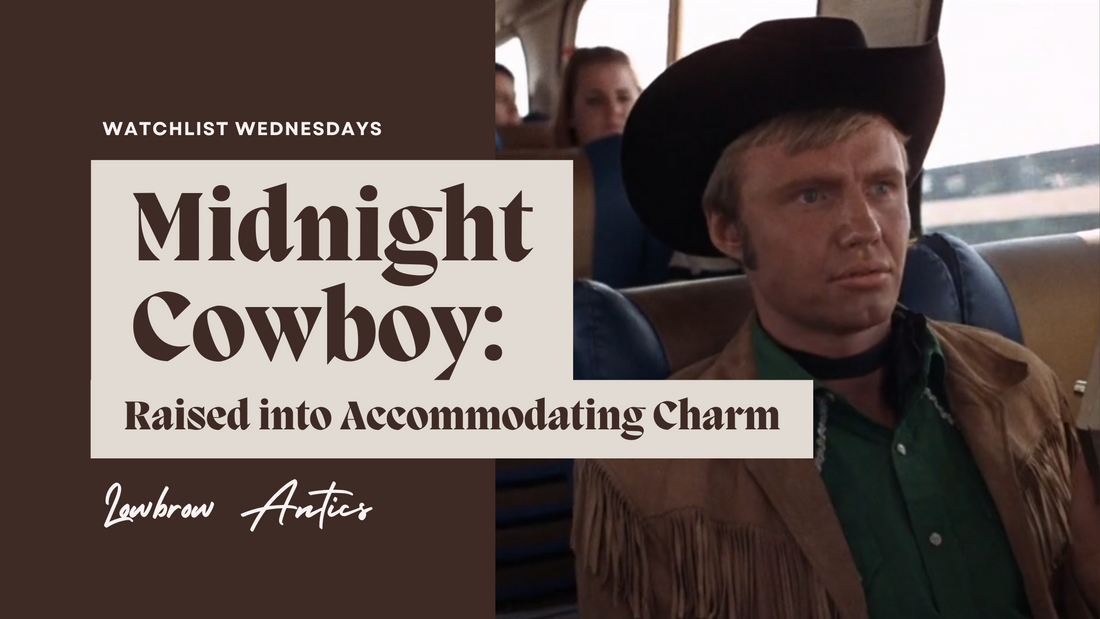John Schlesinger’s 1969 classic Midnight Cowboy is often discussed in the context of its gritty realism, themes of urban isolation, and the tragic relationship between Joe Buck (Jon Voight) and Ratso Rizzo (Dustin Hoffman). However, one of the most compelling arcs within the film is Joe’s slow unraveling of the accommodating charm he was socialized into—an almost tragic need to please others at his own expense. Joe Buck begins the film as a man whose sense of self-worth is deeply entangled with his ability to charm, entertain, and satisfy those around him, a behavior ingrained in him from childhood. By the film’s end, he is stripped bare—literally and figuratively—of this people-pleasing instinct, finally asserting his true personhood.

The Tight Hold of Socialization: Joe’s Childhood Conditioning
Joe’s journey into the unforgiving streets of New York City is marked by a series of flashbacks that provide insight into his formative years. Raised in Texas by his grandmother, Joe is groomed to be a performer of sorts, both in a literal sense—his outward Texan-grown cowboy persona— and in a psychological sense, where his value is measured by how much he can keep others entertained and happy. The most telling flashbacks include moments where he is seen rubbing his grandmother’s back, fulfilling her requests, and absorbing the idea from her male companions that his role in life is to be the perfect cowboy, the perfect partner, the perfect object of desire.
This socialization sets Joe up for failure when he attempts to carve out a life as a hustler in New York. His learned inability to assert himself results in him constantly being taken advantage of—whether by an older woman who flips the script and makes him feel obligated to give her money, or a religious fanatic who preys on his naivety. These interactions show how his ingrained charm and compliance have left him vulnerable, ultimately leading to his financial and emotional destitution.

The Scars of Past Failings: Crazy Annie
Before Joe meets Rico "Ratso" Rizzo, his only attempt at forging an authentic emotional bond was with Crazy Annie, a young woman from his youth. Unlike his later transactional encounters, his relationship with Annie was not built on performance or expectation—it was raw, chaotic, and emotionally charged. However, the trauma they shared—being attacked and assaulted by a group of men—left Annie institutionalized and Joe burdened with crushing guilt. Rather than processing this trauma, Joe buries it, doubling down on his people-pleasing tendencies as a false safety net. His failure to protect Annie convinces him, on a subconscious level, that accommodating others is the only way to avoid further harm. This belief persists until his relationship with Ratso forces him to confront it head-on.

The Tax of Pleasing Others: A Hustler Who Doesn’t Get Paid
Throughout the film, Joe frequently bends to the will of others, almost never receiving what he is owed. When he first attempts to hustle in New York, he ends up giving money away rather than making it. Even when he does engage in sex work, there is often an element of him not advocating for himself—highlighting how deeply his people-pleasing tendencies have sabotaged his attempts to survive. In one of the most gut-wrenching moments, Joe finds himself with a man in a movie theater who is unable to pay after he has already provided his services. Rather than asserting himself, Joe’s conditioning takes over—he comforts the man, reverting back to the role of the accommodating caretaker, even in the bleakest of financial circumstances.
It isn’t until his survival is on the line that Joe begins to fight back. His desperation forces him to finally act on his own behalf, culminating in a violent moment where he physically assaults a client. This marks a shift in Joe’s character—his survival instincts finally override his ingrained tendency to accommodate others, though it comes at the cost of his remaining innocence.

Shedding the Cowboy Garb: A Symbolic Rebirth
One of the most significant moments in Midnight Cowboy comes near the end, when Joe discards his cowboy outfit in a trash can. Throughout the film, his cowboy persona has been both an armor and a burden—a fantasy he has clung to, an identity that has shaped his interactions with the world, but one that has ultimately failed him. By shedding the outfit, Joe is symbolically rejecting not just the illusion of the Western dream, but also the version of himself that was built to serve others.
His decision to go to Florida with Ratso is not just an escape—it is an attempt to build a life on his own terms, without the performative persona he has clung to for so long. Tragically, Ratso does not survive the journey - but Joe does. And in that final moment, sitting on the bus without his cowboy fancies, he is no longer the accommodating performer. He is simply Joe Buck, an uncertain but self-possessed man taking his first steps toward true autonomy.

Conclusion: Breaking Free from the Role
Midnight Cowboy is ultimately a story of self-actualization wrapped in tragedy, in my mind. Joe Buck begins the film believing that his charm and persona will carry him to success, but through a series of brutal encounters, he is forced to confront the reality that his survival depends on shedding that very identity. His journey is a painful but necessary unraveling of the social conditioning that has defined his existence. By the time he reaches Florida, he is no longer the naive cowboy looking to charm and accommodate—he is simply a man trying to reclaim himself from a lifetime of being what others wanted him to be. What can we take away from this? Hopefully, inspiration to do the hard things, make the difficult calls, and show up every day as the people we want and need to be, outside of what others may want or attempt to condition us to be.
